Keeping innovation fresh
As a 12-year-old, Kavita Shukla drank water believed to be contaminated. Because of her grandmother's quick homemade remedy, she didn't get sick. Since then, Shukla has devoted her life to figuring out why the remedy worked and how to replicate and advance its effects to mitigate world hunger.
AN INTERVIEW WITH
Kavita Shukla
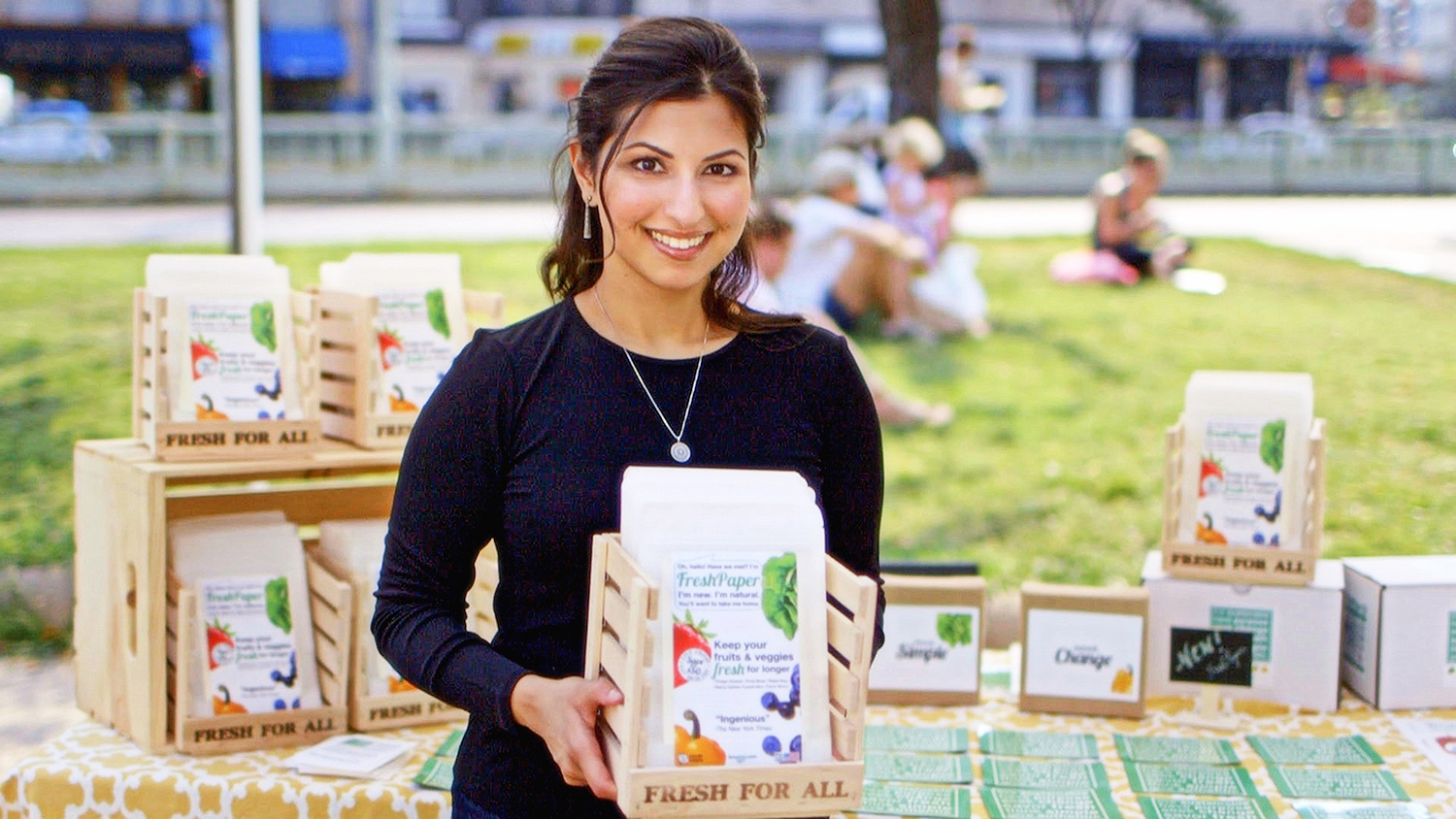
Each month, our Journeys of Innovation series tells the stories of inventors or entrepreneurs who have made a positive difference in the world. Hear it in their own words or read the transcript below.
KAVITA SHUKLA: The world's farmers actually grow enough food to feed everyone on the planet, but over 800 million people still go hungry every single day.
LINDA HOSLER: After a life-changing trip to visit her grandmother in India as a middle-schooler, Kavita Shukla dedicated herself to preventing food spoilage and alleviating hunger around the world. Today, she is the founder and CEO of The FRESHGLOW Co. and the inventor of FreshPaper, sheets infused with botanicals that keep produce fresh for longer periods of time.
I'm Linda Hosler from the United States Patent and Trademark Office. I recently spoke to Shukla about her journey from a 12-year-old experimenting in her garage to a successful entrepreneur. She discussed the impact of self-doubt on invention, how important it is to share the stories of other innovators, and the inspiration behind FreshPaper.
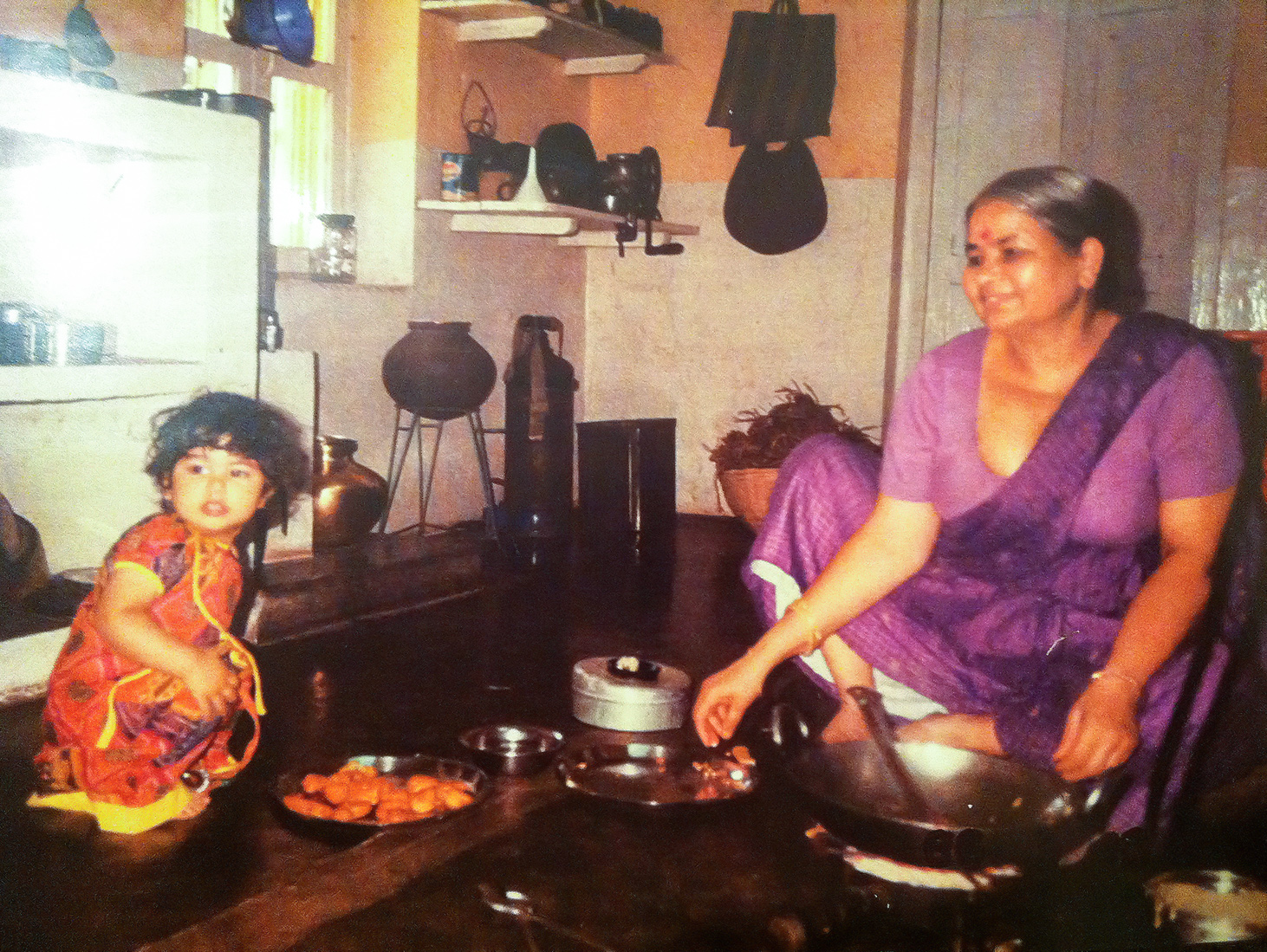
Kavita Shukla (left) as a child with her grandmother (right), who inspired FreshPaper. Photo courtesy of The FRESHGLOW Co.
KAVITA SHUKLA: FreshPaper actually started as my middle school science project, and it was actually inspired by my grandmother in India. So, when I was 12 years old, I was visiting my grandmother, and I accidentally drank some tap water while brushing my teeth. And my parents had warned me to be really careful about that because often the tap water can be contaminated, and I remember I was so worried that I would get sick, but my grandmother, she just gave me this homemade mixture of spices that she had created in her kitchen. And she said, "Just try this, and you should be fine." And I remember I was really skeptical, but I also was really curious, and I ended up drinking my grandmother's remedy. I didn't get sick, and I'll never forget that moment because it really sparked my curiosity. And it seemed almost magical to me that my grandmother, using very simple ingredients, could have created something so powerful. So, that was really what has now become for me kind of a lifelong fascination with botanicals and spices and a sense of curiosity.
LINDA HOSLER: Did you think of yourself as an inventor back then, too?
KAVITA SHUKLA: I really didn't think of myself as an inventor. When I was a little girl, I was always tinkering around and experimenting and creating various contraptions, my mom would always tell me, but I don't think I even understood really at the time what an inventor was.
LINDA HOSLER: You mentioned these other experiments. What were they?
KAVITA SHUKLA: Some of my early inventions were always things to try to make my chores a little bit easier. I think I created a rabbit cage cleaner when I was very young. I was always kind of looking at the world with curiosity, and I think a lot of that was because my family moved around a lot when I was a little girl. We immigrated to the United States when I was 5, so my surroundings changed a lot, and I think that made me really observant and very curious about what was going on.
Food waste is this massive and very overwhelming challenge, but it's actually something that every single one of us can start to address in our own homes.
KAVITA SHUKLA
LINDA HOSLER: And you've mentioned that this idea that you had when you were 12 really became your life's work. What did it mean for your life to have such a big idea at an early age?
KAVITA SHUKLA: I think I could have never imagined in middle school that today, decades later, I would still be working on that idea, that I would still be working on the same idea I started working on as a little girl. So, I think in many ways that that journey has really defined my career and my life, and it really changed the trajectory of my life. I guess I always say I kind of peaked in middle school.
LINDA HOSLER: That's such a wonderful story, and I feel like it's so rare for us to have something that happens to us in middle school that we actually get to live through. I know that FreshPaper and your company have a very central social initiative about hunger and food spoilage. Why is that such an important issue for you?
KAVITA SHUKLA: Well, food waste is this massive and very overwhelming challenge, but it's actually something that every single one of us can start to address in our own homes. But I was shocked when I first learned that we lose over a third of our world's food supply. The world's farmers actually grow enough food to feed everyone on the planet, but over 800 million people still go hungry every single day. So, I think food waste is a challenge that can feel really overwhelming, but what's also inspiring is that there are really small and simple interventions we can all make to start to reduce food waste. And that's something that, you know, I've been really encouraged to see innovators starting to look towards, and we've been really excited that FreshPaper is helping people take on food waste in their own homes in a small and simple way.
LINDA HOSLER: Was there anything in particular in your life that made you interested in this topic in the first place?
KAVITA SHUKLA: As an immigrant, I was always really aware of kind of the massive global challenge of hunger, and I was always aware of what it was like to look at a world where we felt like we had so much abundance. This idea that we actually grow enough food to feed everyone on the planet, but because of inefficiencies in the food system, there are, you know, so many people that go hungry every single day. So, I think that was always something that was really interesting to me, and my grandmother grew up without a refrigerator. Over a billion people still live without access to refrigeration, and I think that was really what inspired me to keep going with FreshPaper because I felt like there was a simple technology that could be affordable and useful for people that didn't have access to anything at all.
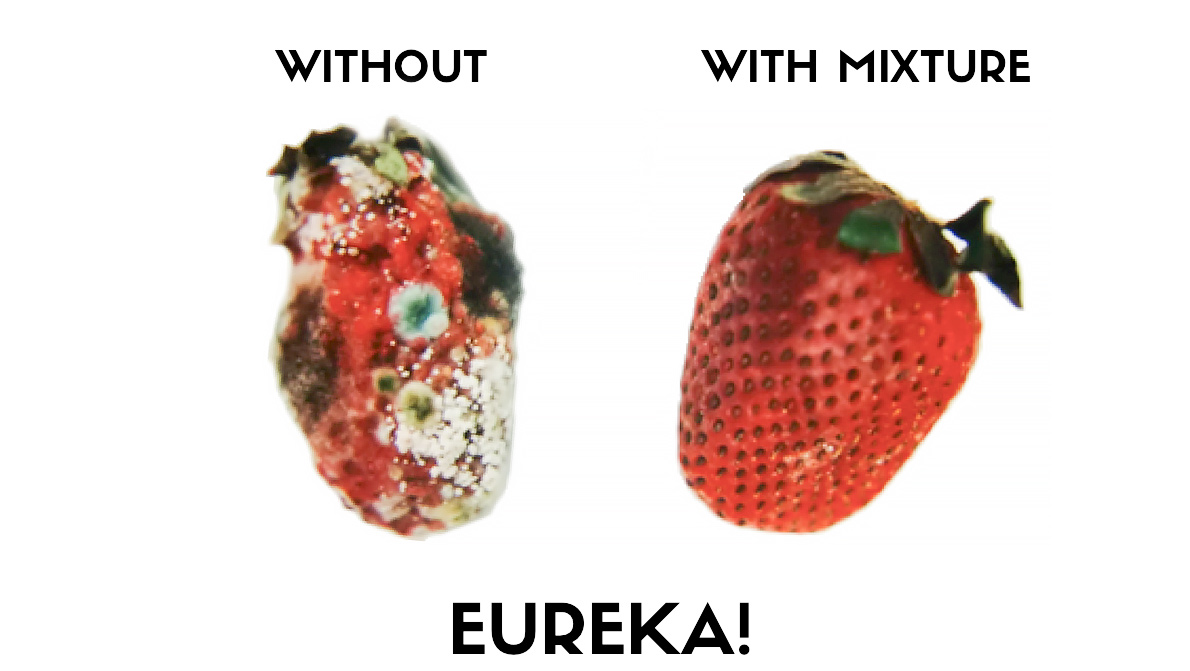
As a child, Kavita Shukla originally tested her idea by comparing fruit, like strawberries, in jars filled with a mix of pond water and spices to fruit not exposed to the mixture. Due to the blend of spices in FreshPaper, produce stays fresh up to four times longer. Photo courtesy of The FRESHGLOW Co.
LINDA HOSLER: Shukla identified the problem of global hunger at an early age, and she knew her solution could help people like her grandmother all over the world. Still, it was years before she launched FreshPaper.
Young women, particularly women of color, are often discouraged from invention and entrepreneurship, and struggle with self-doubt. According to recent research and reporting, people from marginalized communities are more likely to experience this when they have no clear role models. In fact, girls are more likely to invent if they grow up surrounded by more female inventors.
Shukla experienced self-doubt firsthand. Despite her initial confidence, she abandoned her idea for almost a decade.
Today, Shukla can identify where the uncertainty originated and what had to change for her to move forward with FreshPaper.
[T]he more we can share stories of women entrepreneurs, of people who have walked this path before, who have faced obstacles and have been able to bring their ideas to the world ... it really encourages and inspires young girls and women to think about doing more with their ideas.
KAVITA SHUKLA
KAVITA SHUKLA: It's been said that you can't be what you can't see, and I think that's really true. When I look back at my story, I think a lot of what gave me doubt was that I just didn't have a lot of examples. I couldn't look towards a lot of stories of women entrepreneurs who had faced the same obstacles, who had been through this. And that's why I was so excited to participate in this conversation, and I think what you're doing is so critical because the more we can share stories of women entrepreneurs, of people who have walked this path before, who have faced obstacles and have been able to bring their ideas to the world, I think it really encourages and inspires young girls and women to think about doing more with their ideas.
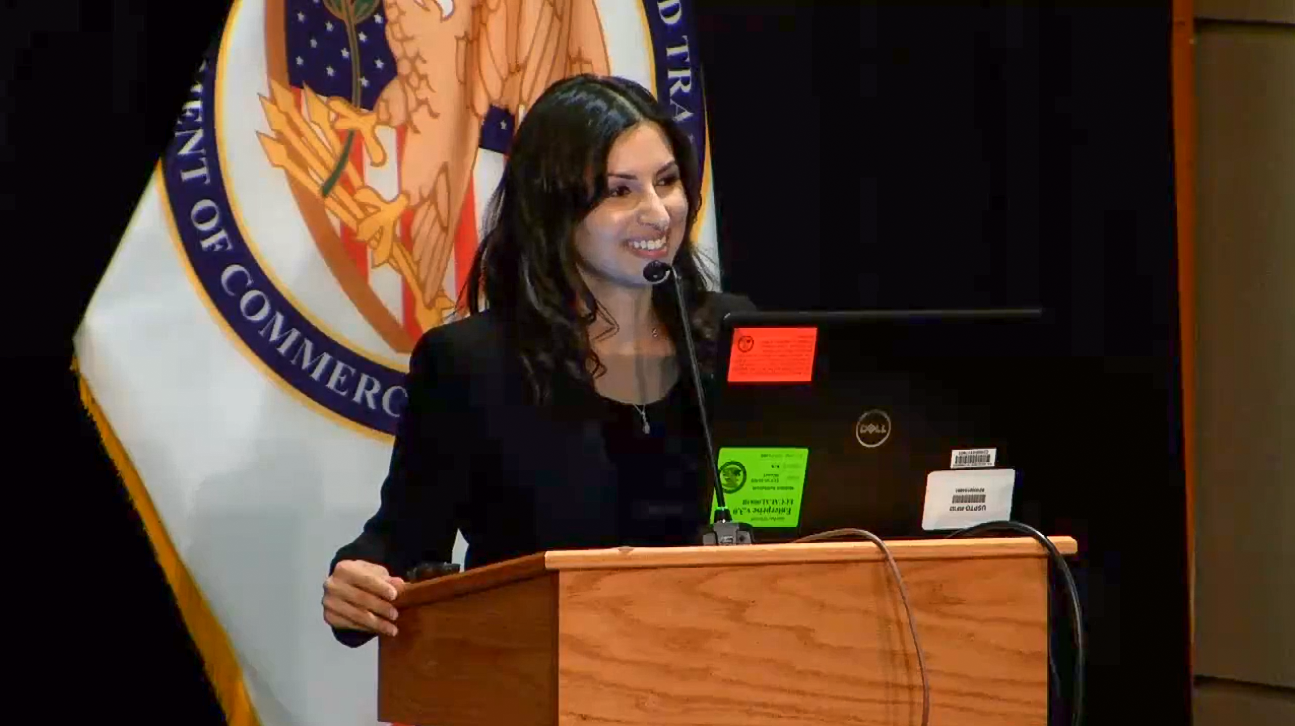
Kavita Shukla gave the keynote address at the United States Patent and Trademark Office's (USPTO) Invention-Con 2019. Invention-Con is an annual conference for independent inventors, entrepreneurs, small business owners, and intellectual property (IP) professionals at the USPTO's headquarters in Alexandria, Virginia. Video still from "Keynote presentation," published November 21, 2019.
I was a senior in high school when I found out that I would be granted a patent for FreshPaper, and I remember still the moment that I found out, I was so excited, and I just couldn't wait to get my idea out into the world. I really believed that it could have an impact. And I really wanted to get it to parts of the world where people didn't have access to refrigeration, where I felt like this idea could be transformative. One of the first things I did when I got to college was to just start to share my idea, to talk to a lot of experts, and what I kept hearing was that I would need to raise significant amounts of money. I would need a lot more infrastructure, I would need a lot more experience, and that to scale the idea, it would really be something that required much more significant resources than I felt like I would ever be able to gather.
And I think for me, that was really discouraging because I think as a young woman, I just couldn't imagine how I would have the experience or how I would be able to raise the funding that would be required to bring an idea like this into the world. And that was, I think, kind of what made me start to doubt my own ability to do that. And that went on for almost a decade. I kept trying, and I kept facing obstacles, and I stopped being able to believe that I would be able to do anything with FreshPaper.
LINDA HOSLER: And then what happened that gave you the courage to eventually go back?
KAVITA SHUKLA: As much as I tried, I could never really let go of the idea. At that point, I had spent most of my life working on FreshPaper, and I really believed in it, and even though I felt like it probably would never go anywhere, I just couldn't let it go. And so it was almost when I had completely given up and I felt like I would never be able to do anything with my idea, I thought, well, you know, at the very least, perhaps there are a couple of farmers at my local farmers market that might be able to use FreshPaper. I used to go to the farmers market on the street where I lived in Cambridge, Massachusetts, every weekend. I had gotten to know some of the farmers, and I was really nervous to share this idea with them, but I also felt like, well, maybe if they could use FreshPaper to extend the life and the freshness of the crops that they bring to the market through those really hot days in Boston, maybe they can donate what they have left at the end of the day. So, that was really the idea.
I made FreshPaper by hand in my kitchen. I had this tiny studio apartment. I bought supplies at the local hardware store and just kind of made it. I stayed up all night. I still remember making FreshPaper and taking it. I took it to my farmers market early the next morning, and I was just amazed to see that not only were they really excited about it, but they felt like there really was potential that some of their customers would want to use FreshPaper and that people in my own backyard were actually really struggling with food waste and were looking for simple and natural solutions to help them.
I think the first time you share your idea with anyone it can be really scary, but the idea of sharing it with people that might take it home and use it was exciting, but also terrifying.
KAVITA SHUKLA
LINDA HOSLER: At this farmers market, I heard that when you were first getting ready to sell FreshPaper, you actually had to give it away.
KAVITA SHUKLA: Yeah, well, I remember I was so nervous about actually sharing my idea with people at the farmers market. You know, one thing that I actually remember is I stayed up all night making FreshPaper, but then I also made cupcakes because I was worried that nobody would stop and talk to me. And so I remember I stood on the street, and I was just handing out sheets to see if people would be willing to take it home and try it. So I gave FreshPaper to a lot of the farmers, and then I gave it to people to take home. That was really scary. I think the first time you share your idea with anyone it can be really scary, but the idea of sharing it with people that might take it home and use it was exciting, but also terrifying.
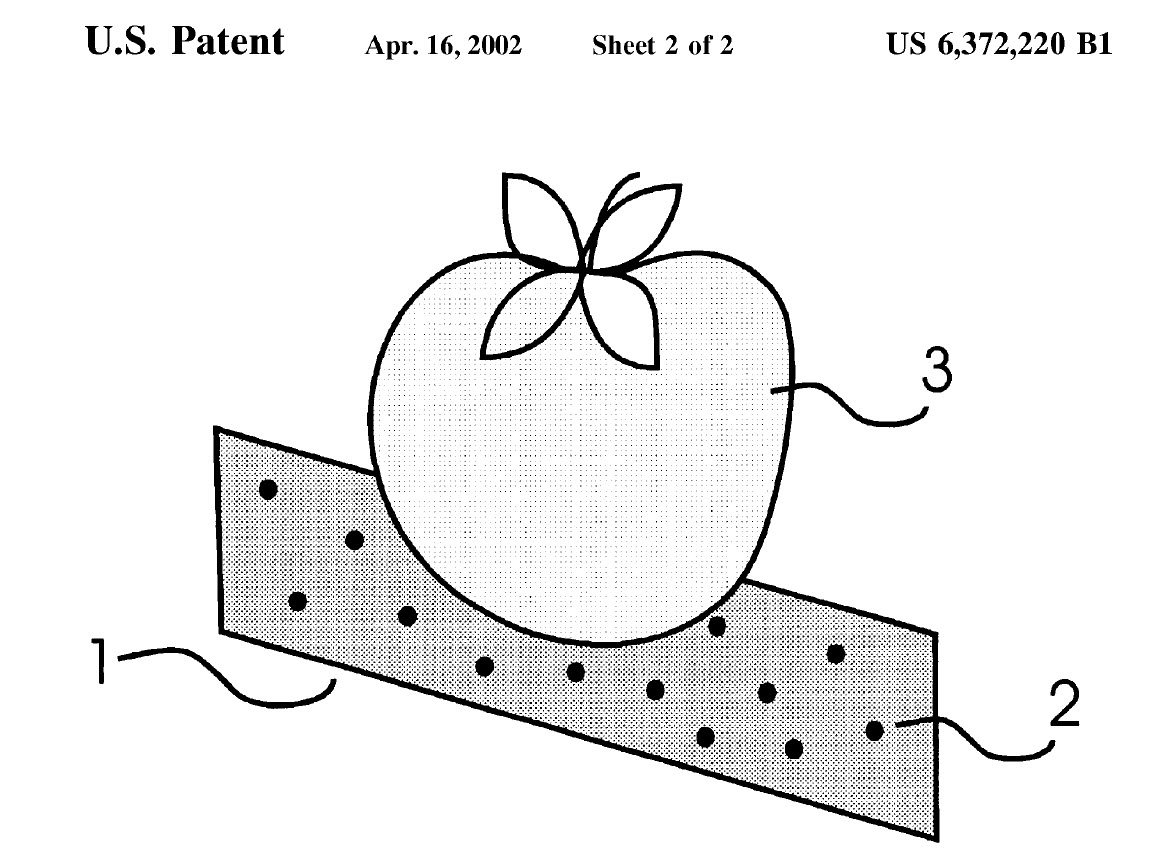
Kavita Shukla received U.S. Patent No. 6,372,220 B1 for "fenugreek impregnated material for the preservation of perishable substances" on April 16, 2002. Above, figure 2 in the patent "shows an edible substance (3), in this instance a strawberry, which has been placed on a material with particles of a botanical extract embedded on it." In total, Shukla holds four U.S. patents.
LINDA HOSLER: You mentioned getting your patent for FreshPaper when you were a senior in high school, and IP protection is important to people for many different reasons, but I wanted to ask you why was getting your IP protected important to you?
KAVITA SHUKLA: Some of the best advice that I ever got was the idea that I should patent FreshPaper. It was advice that I received when I was at the science fair in high school, and I think it was so critical because I was a 17-year-old girl when I first got the patent for FreshPaper, and I knew that I wanted to bring this idea into the world and I wanted it to have an impact. And I had a sense of the social mission that was really important to me, but I didn't have the resources, and I didn't quite know how to do that yet, and I think having a patent gave me the opportunity to be an entrepreneur and to build a business around my idea, to build a social enterprise and to be able to guide how it reached people in the world. And that was really critical.
LINDA HOSLER: And so you went from a high-schooler and to now, your company has a very sophisticated intellectual property strategy; it involves patents, trademarks, and trade secrets. How did you decide that you were going to keep a trade secret versus obtaining a patent?
KAVITA SHUKLA: I've been really fortunate to have really good advice and great advisors from the very beginning. And there are so many people that have supported me along this journey, but I was able to get really good advice on how even I, as a small business and as an entrepreneur, could protect my ideas so that I could compete in a market with much larger players. And I think that has made a huge difference.
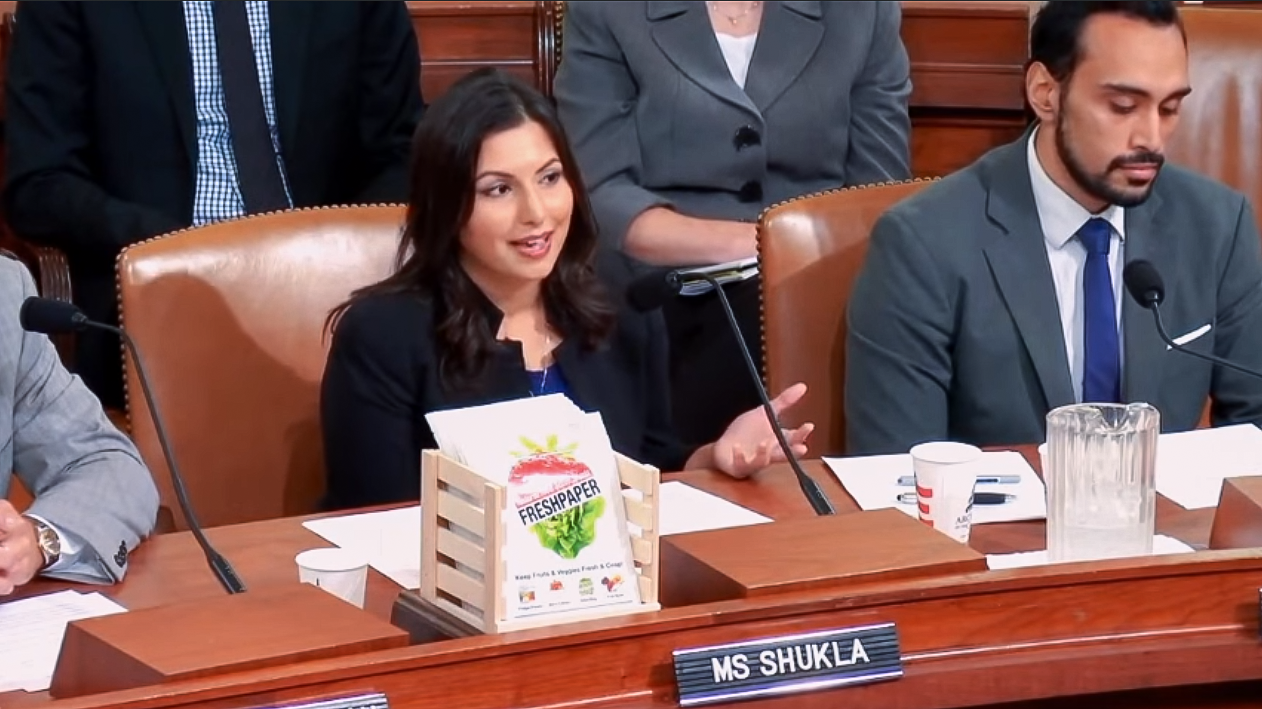
Kavita Shukla testifies before Congress during the hearing on expanding U.S. digital trade and eliminating barriers to U.S. digital exports on July 13, 2016. Video still from "W&M [Committee on Ways & Means] Hearing: Jul 13, 2016," published March 18, 2019.
LINDA HOSLER: And what do you think the FreshPaper journey would have been like without a patent or any IP protections?
KAVITA SHUKLA: It certainly would have been very different. I don't know that I would be an entrepreneur. I don't know that I would have been able to guide this idea and to help it reach people that could really benefit from it. So, I think that patent that I received when I was in high school was just critical. It really changed the trajectory of this idea completely.
LINDA HOSLER: Have you ever had to leverage your IP protections because of infringement on your products?
KAVITA SHUKLA: Yeah, so I think that can be something that all entrepreneurs face, and that was actually something that I was very nervous about, when I was even at the farmers market, when I was first starting my business, because FreshPaper is my life's work, and the idea that people could infringe on it, that there could be copies, can be really scary. But I think the IP protection has been really valuable, and actually, we have been really fortunate in the market to be able to create a product that we haven't really struggled with that.
LINDA HOSLER: So, you mentioned the central mission of FreshPaper and that you've actually had that as part of your idea since middle school. You started locally at your farmers market, but you had this big global idea. So, what does it mean to start small and locally when you have such a big idea?
KAVITA SHUKLA: Because I was a child, I think I actually ended up developing it as a technology that was so simple and so affordable that I felt like it could be used by anyone in any part of the world. And I really wanted to reach people in areas like the village where my grandmother was from in India. I wanted to reach people that didn't have access to anything at all to keep their food fresh. And at the time, I don't think I even realized that food waste was a global problem that affected people even in my own community, in Cambridge, Massachusetts. So, I think going to the farmers market not only opened my eyes up to the idea that this was a massive global challenge and that even people in Cambridge were struggling to keep food fresh for longer. They were struggling to be able to feed their families fresh, healthy food because it can be really expensive when your food goes bad, and that even the food banks in the United States really struggled with food spoilage. So, that was really eye-opening for me.
But I think I also was amazed to realize that by selling FreshPaper at my farmers market, and then the growth that we had because people really believed in this idea and kind of started to spread it across the globe, we were able to reach other markets and to reach people across the globe more quickly than I could have ever imagined. It's really wonderful to design a product or an innovation with a global vision, which is the idea that it should be something that could be used by anyone in any part of the world, but to think about starting their businesses and starting to bring their ideas to people locally, and you can start really in your own community.
For all of the opposition and the doubt, there are so many people that will support you and ... believe in your idea, and that will help you take the next step.
KAVITA SHUKLA
LINDA HOSLER: What advice do you have for those who want to bring their own big ideas to market?
KAVITA SHUKLA: That very first day when I went to the farmers market, that changed everything for me. I think putting my idea in the hands of people that could really use it and give me feedback and who shared it with others was transformative. So, I would encourage entrepreneurs and inventors to just take the first step and to share their ideas with the people that could benefit from them.
LINDA HOSLER: What opposition have you faced in your career, and what advice would you give to other innovators who might be going through similar trials?
KAVITA SHUKLA: Any time you try to do something new or different, or you try to bring a new idea into the world, there can be a lot of opposition. For me, I've spoken about how a lot of that was my own doubt, my own self-doubt, that I would ever be enough to bring my idea to the world, but once I went to the farmers market, and once I started to share FreshPaper, what I was really amazed by was all of the people that came forward to support me and all of the people, starting with the first people at the farmers market, that have showed up at every step of the journey to help me scale the idea, to help bring it to more people. I think that's what I would really encourage innovators and entrepreneurs to think about. For all of the opposition and the doubt, there are so many people that will support you and that will believe in your idea, and that will help you take the next step. So, if you can just get yourself to take that first step, it's really amazing how things can unfold.
LINDA HOSLER: Looking back at the impact of your invention and your career, what are you most proud of?
KAVITA SHUKLA: I'm most proud that I've had the opportunity to mentor other young women and girls who have ideas, and I've been able to encourage them to maybe dream a little bit bigger with their ideas. I think that's been really fulfilling for me to see that just by sharing my story, by sharing the obstacles that I've faced and the journey that I've had, I've been able to inspire some others to take the first step with their ideas.
LINDA HOSLER: You mentioned you have a new baby. What kind of world would you like to see for your child as she grows up?
KAVITA SHUKLA: My daughter, she inspires me every day because I constantly think about the world that I would want her to grow up in. And so, I think that's what inspires my work in trying to make the world that we leave for her a little bit more sustainable, greener, and more beautiful.
LINDA HOSLER: Because of Shukla’s devotion to her initial idea, a more sustainable food market is already within reach. And this is just the start. Inspired by the global challenges we all face, including climate change, Shukla says her current work also focuses on making the world a bit greener. We’re excited to see what she does next.
From the USPTO, thanks for listening.
Credits
Produced by the USPTO Office of the Chief Communications Officer. For feedback or questions, please contact OCCOfeedback@uspto.gov.
Interview by Linda Hosler. Audio editing by Jay Premack. Story production by Lauren Emanuel. Additional contributions from Marie Ladino. Photo at top of page of Kavita Shukla at the Dupont Circle farmers market in Washington, D.C., courtesy of The FRESHGLOW Co.
References
Bedi, Joyce. "Kavita Shukla." https://invention.si.edu/node/28532/p/723-kavita-shukla.
Bell, Alex, et al. "Who Becomes an Inventor in America? The Importance of Exposure to Innovation." www.equality-of-opportunity.org/assets/documents/inventors_paper.pdf.
Committee on Ways & Means. "W&M Hearing: Jul 13, 2016." Published March 18, 2019, www.youtube.com/watch?v=Qqstl_N3GhQ.
"Kavita Shukla: Inventor, Designer, Entrepreneur." www.kavitashukla.com.
Nance-Nash, Sheryl. "Why Imposter Syndrome Hits Women and Women of Colour Harder." www.bbc.com/worklife/article/20200724-why-imposter-syndrome-hits-women-….
U.S. Patent and Trademark Office. "Invention-Con." www.uspto.gov/about-us/events/invention-con.
U.S. Patent and Trademark Office. "Keynote presentation." Published November 21, 2019, www.youtube.com/watch?v=mVACmA_vOLY.

